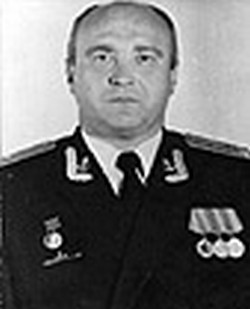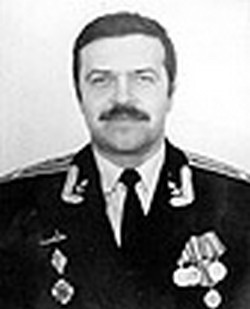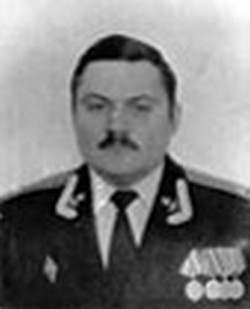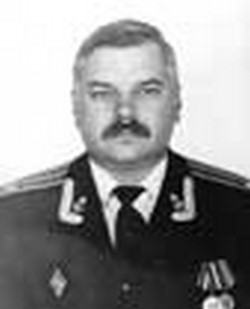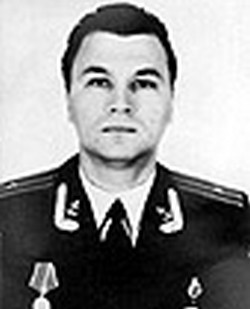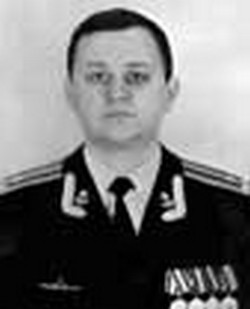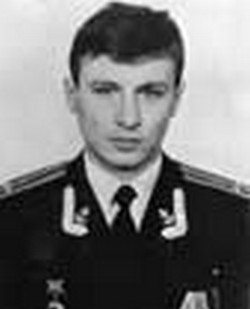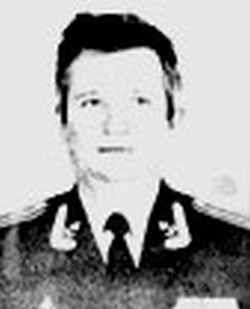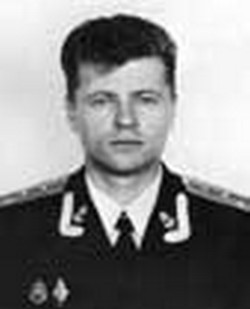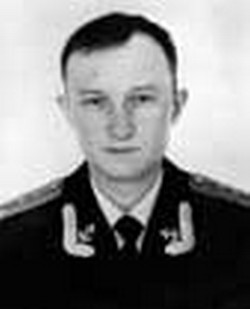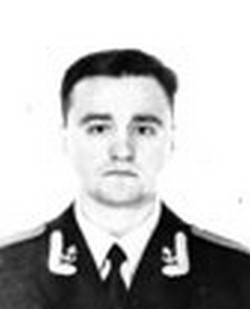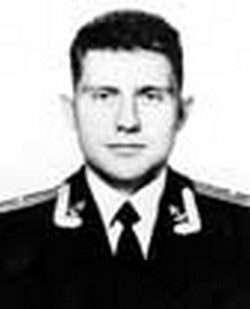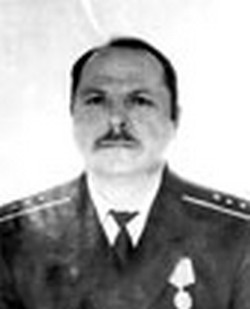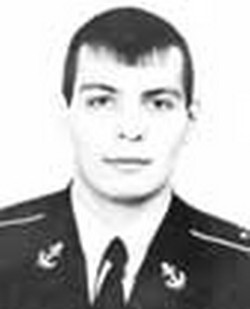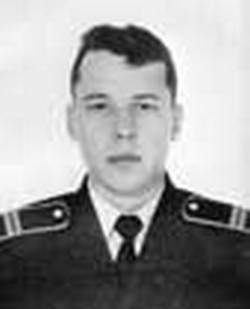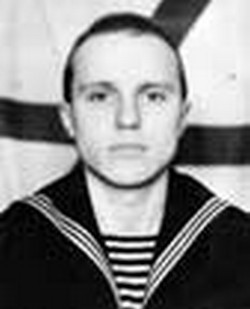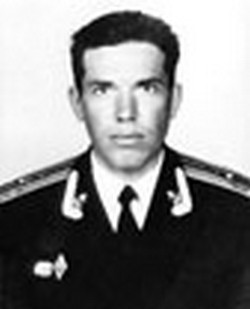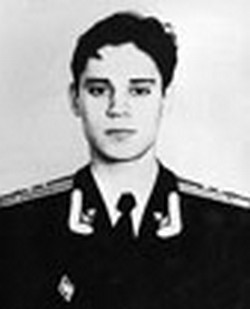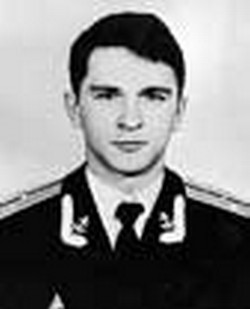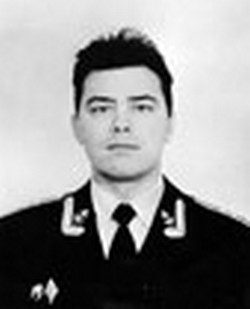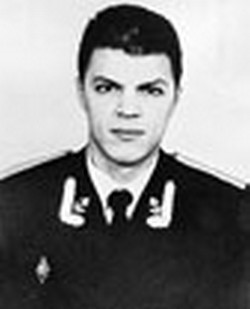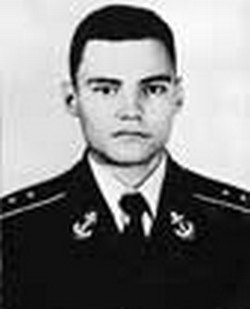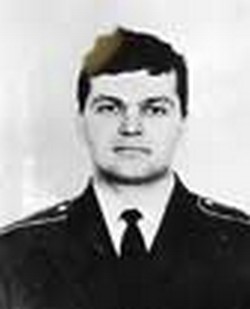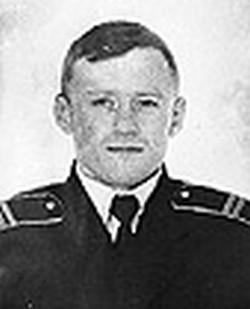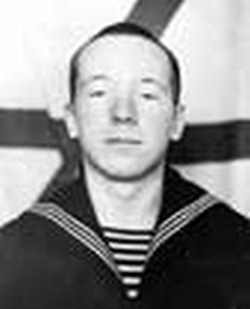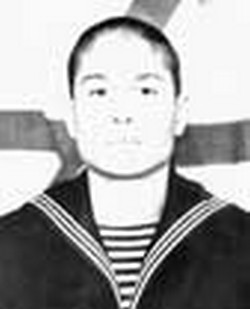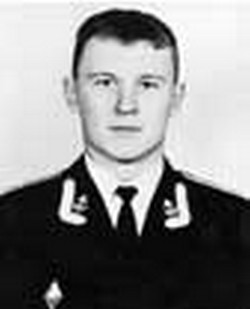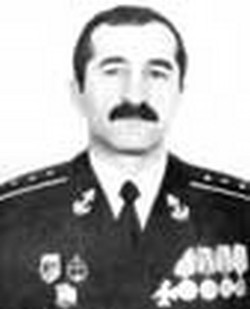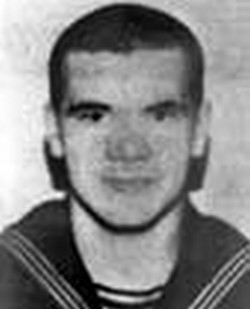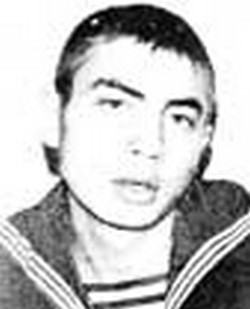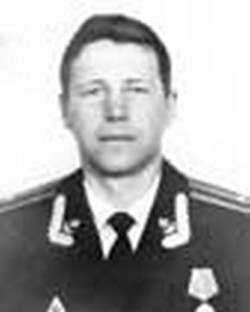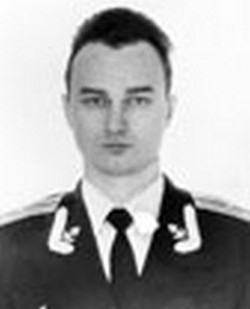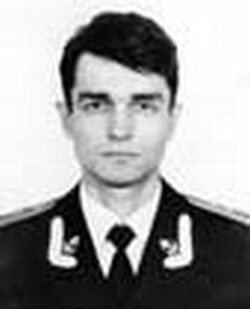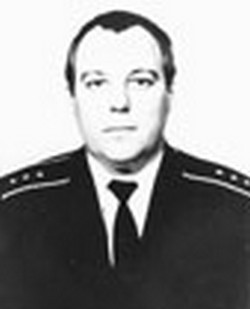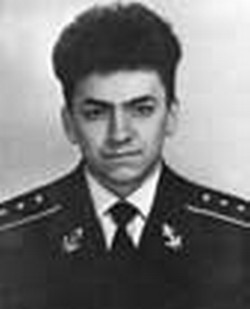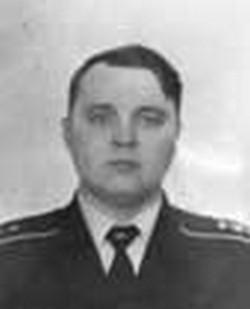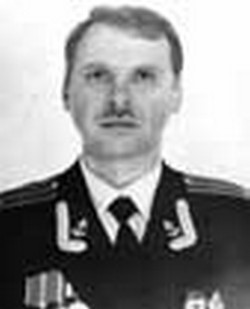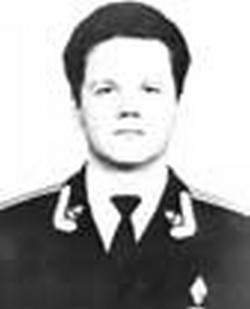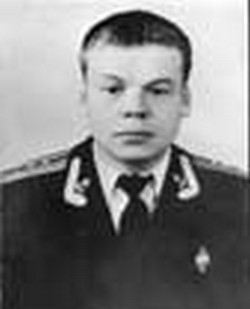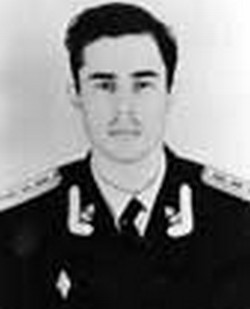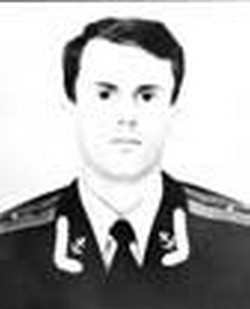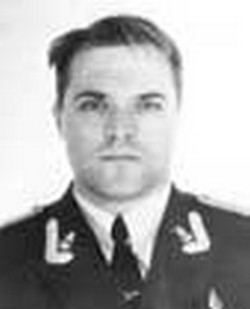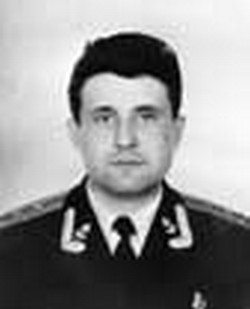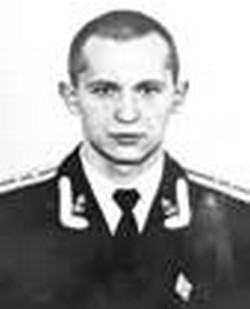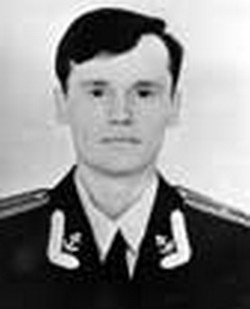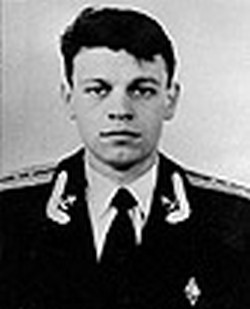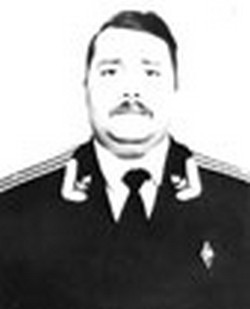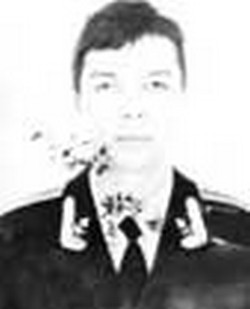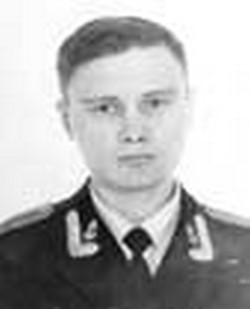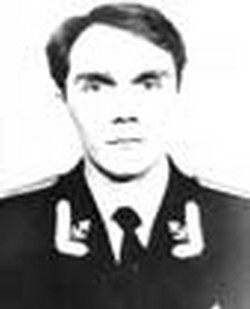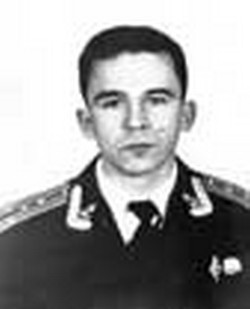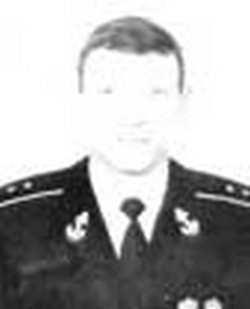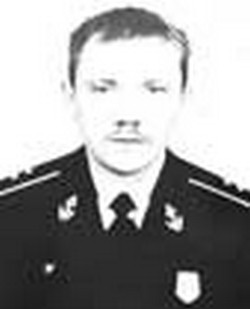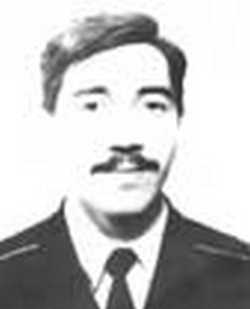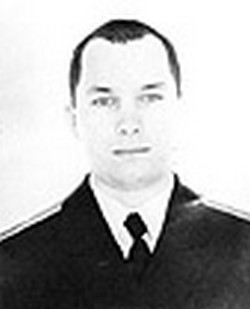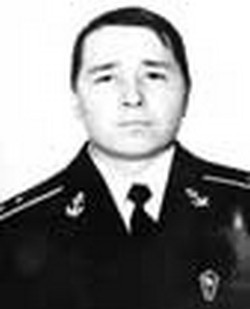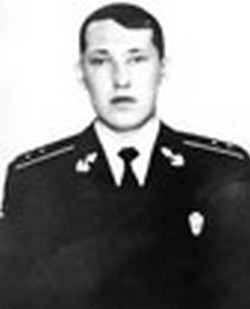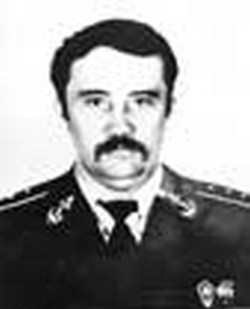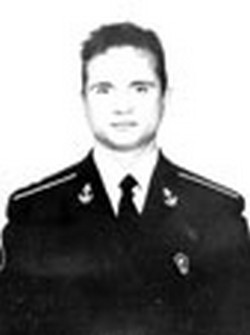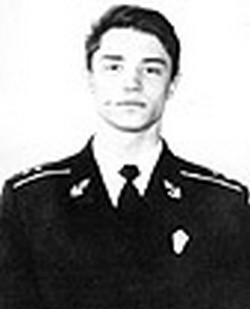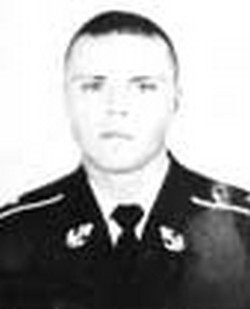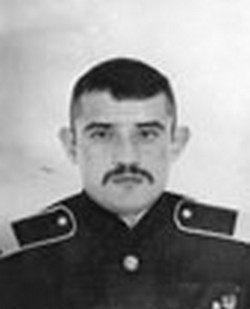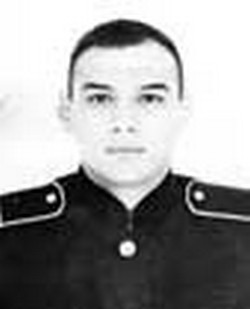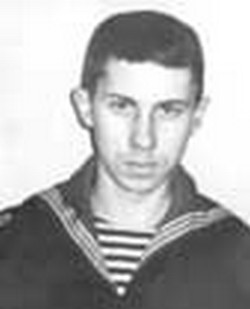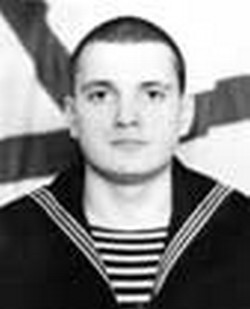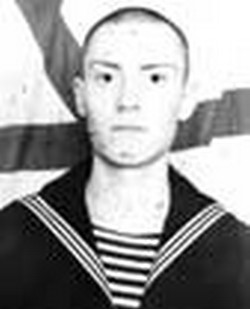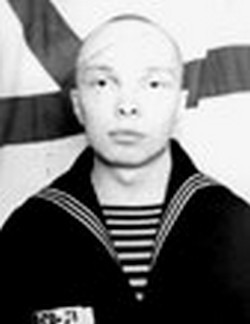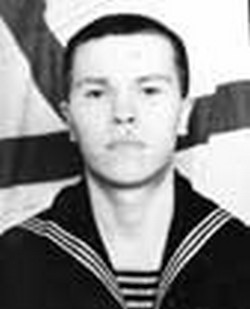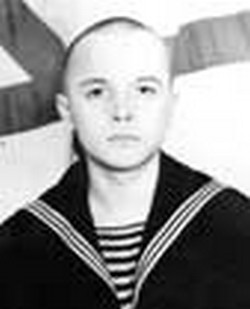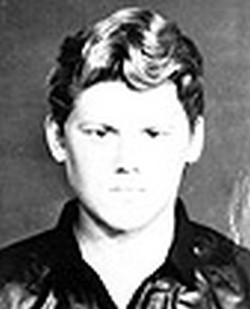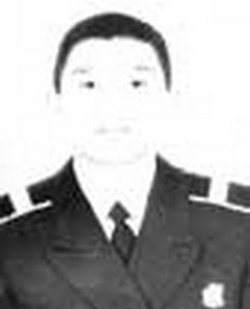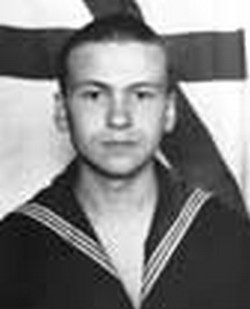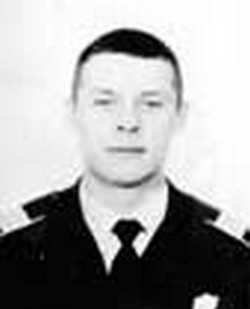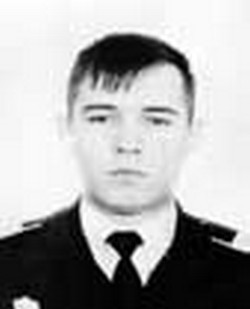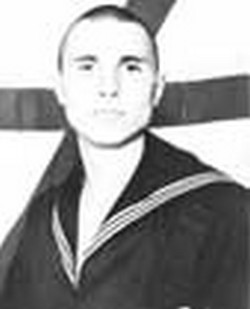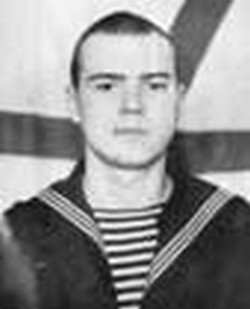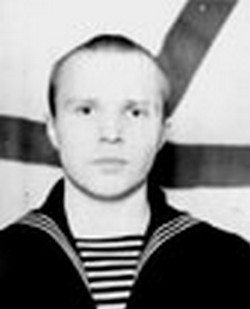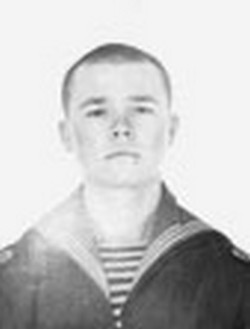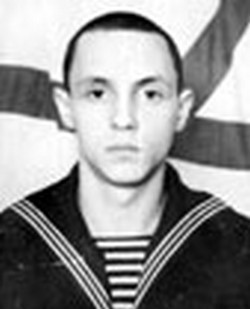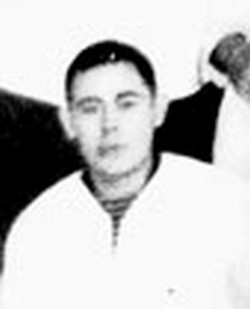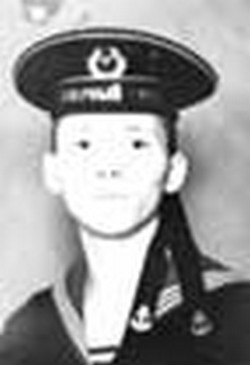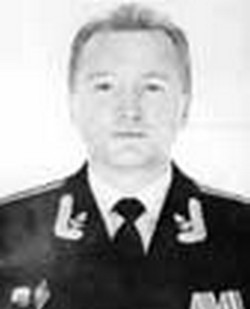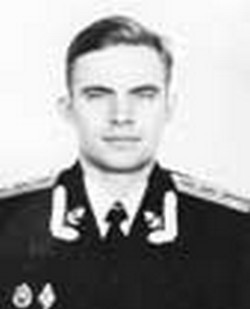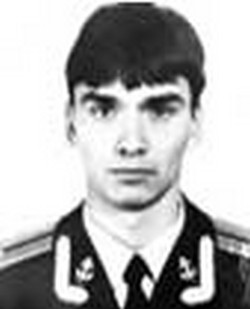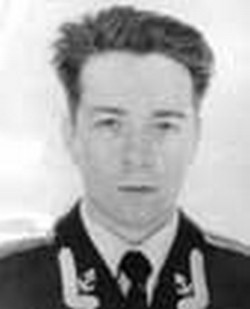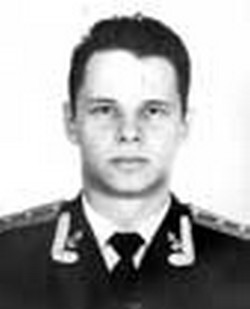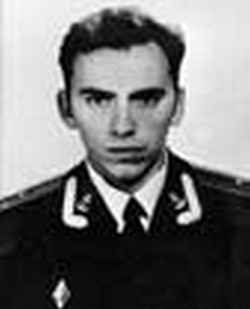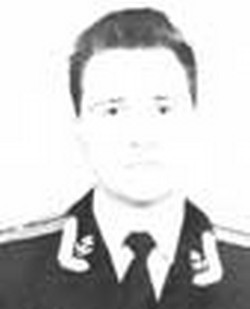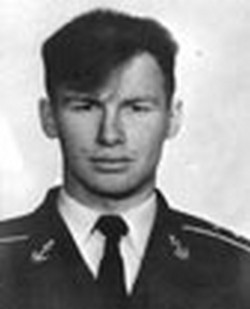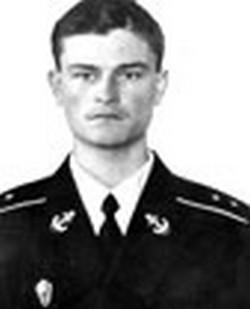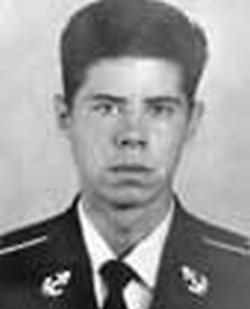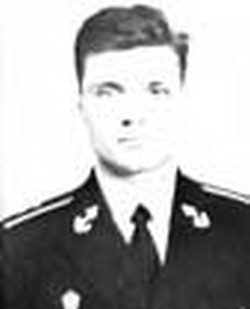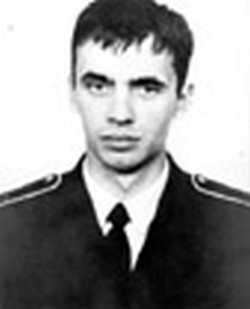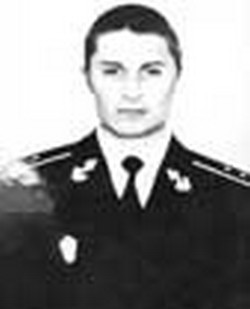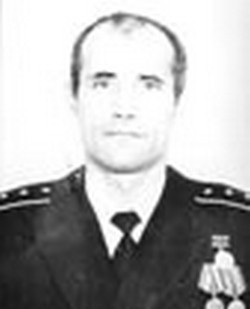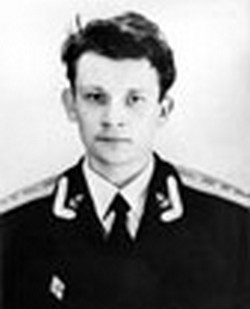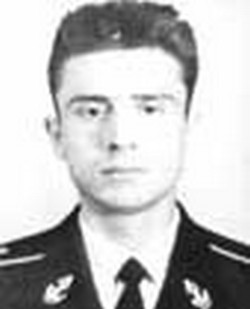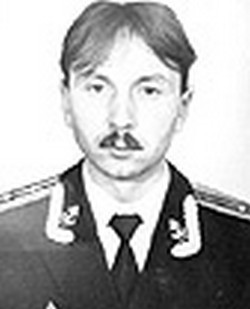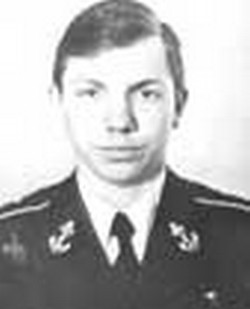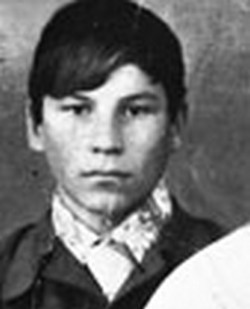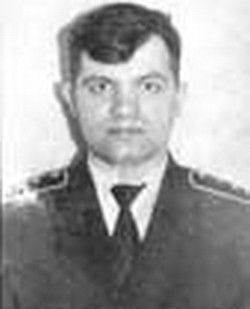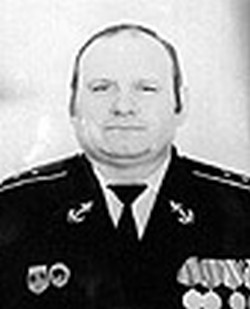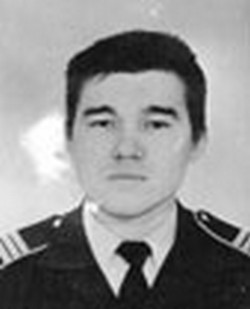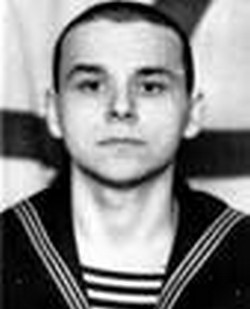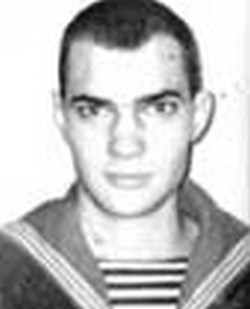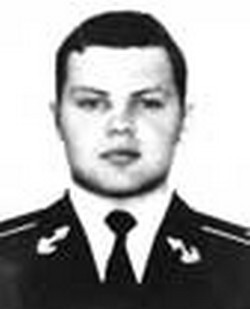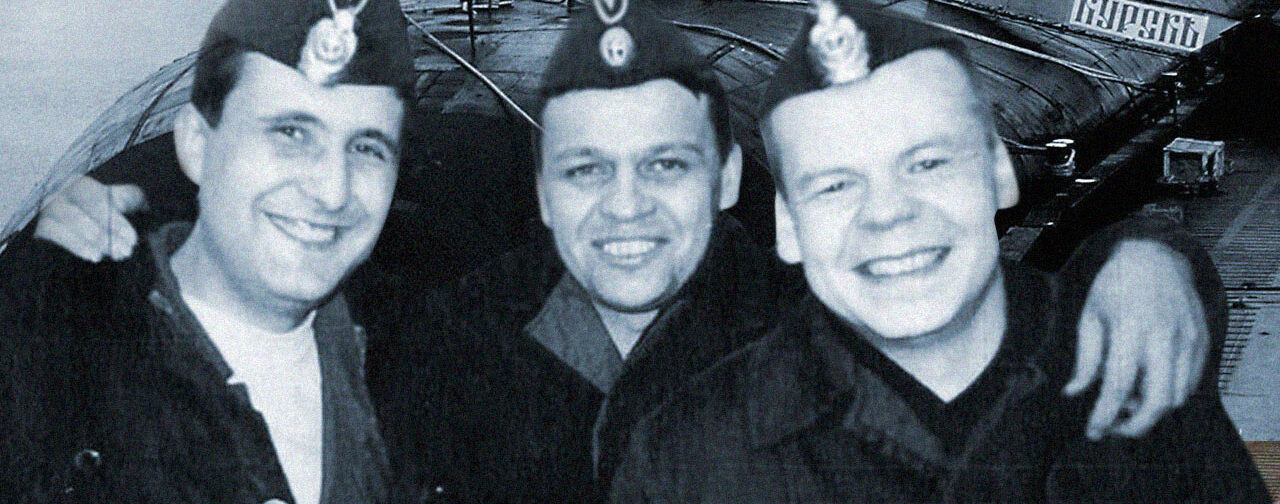
En memoria de la tripulación del K-141 "Kursk": nombres y rostros
Sede de marcha
Capitán de primer rango Bagryantsev Vladimir Tikhonovich - jefe de personal de una división de submarinos, nacido en 1958, ChVVMU, VMA im. N.G. Kuznetsova
Capitán de segundo rango Viktor Mikhailovich Belogun - Adjunto NEMS, nacido en 1960, SVVMIU
Capitán de segundo rango Yuri Tikhonovich Shchepetnov - ingeniero de misiles insignia, nacido en 1964, ChVVMU
Capitán de segundo rango Vasily Sergeevich Isaenko - asistente NEMS, nacido en 1961, SVVMIU
Capitán de tercer rango Baigarin Murat Ikhtiyarovich - Minero insignia interino, nacido en 1964, VVMUPP
Tripulación
Mando de barco
Capitán de primer rango Lyachin Gennady Petrovich - comandante del submarino nuclear, nacido en 1955, VVMUPP
Capitán de segundo rango Sergey Vladimirovich Dudko - Asistente principal del comandante, nacido en 1969, VVMURE
Capitán de segundo rango Shubin Alexander Anatolyevich - Subcomandante para el trabajo educativo, 1959, SVVMIU
Teniente comandante Dmitry Repnikov - comandante asistente, nacido en 1973, VVMUPP
Warhead-1
Teniente-comandante Maksim Anatolyevich Safonov - comandante del BC-1, nacido en 1974, VVMUPP
Teniente Tylik Sergey Nikolaevich - comandante de ENG, nacido en 1975, VVMUPP
Teniente mayor Vadim Yaroslavovich Bubniv - ingeniero ENG, nacido en 1977, San Petersburgo VMI
Suboficial superior Ruzlev Alexander Vladimirovich - contramaestre superior, 1976, p. Vidyaevo
Suboficial superior Fesak Vladimir Vasilievich - técnico ENG, nacido en 1962, región de Donetsk, Shakhtersk
Suboficial Kozyrev Konstantin Vladimirovich - técnico ENG, nacido en 1976, v. Vidyaevo
Suboficial Polyansky Andrey Nikolaevich - técnico ENG, 1974, Tikhoretsky
Suboficial del segundo artículo del contrato de servicio Leonov Dmitry Anatolyevich - comandante del escuadrón de timonel, nacido en 1979, región de Moscú, Yakhroma
Sailor Mirtov Dmitry Sergeevich - señalizador de dirección, nacido en 1981, República de Komi, Ukhta
Warhead-2
Capitán de tercer rango Andrey Borisovich Silogava - Comandante del BC-2, nacido en 1970, KVVMU
Teniente-comandante Alexey Vladimirovich Shevchuk - comandante de la Dirección Principal, nacido en 1974, VVMUPP
Teniente senior Panarin Andrey Vladimirovich - ingeniero de la Universidad Estatal, nacido en 1975, S-Pb VMI
Teniente-comandante Boris Vladimirovich Geletin - Comandante de la GS, nacido en 1975, KVVMU
Teniente mayor Uzkiy Sergei Vasilievich - comandante de la Administración Central Principal, nacido en 1977, S-Pb VMI
Suboficial Vishnyakov Maksim Igorevich - técnico del Departamento Central Principal, nacido en 1977, Krivoy Rog
Suboficial Kislinsky Sergey Alexandrovich - técnico SG, 1974, región de Kostroma, pueblo de Tarecha
Suboficial del segundo artículo del contrato de servicio Anenkov Yuri Anatolyevich - mecánico, nacido en 1979, región de Kursk, pueblo Podazovka
Sailor Kotkov Dmitry Anatolyevich - mecánico, nacido en 1981, región de Vologda, pueblo de Novinki
Sailor Pavlov Nikolay Vladimirovich - mecánico, nacido en 1980, región de Voronezh, p. Leskovo
Warhead-3
Teniente senior Ivanov-Pavlov Alexey Alexandrovich - comandante de la ojiva-3, nacido en 1977, S-Pb VMI
Suboficial superior Ildarov Abdulkadyr Mirzaevich - capataz del equipo de torpedos, nacido en 1960, República de Daguestán, p. Hoochney
Sailor Ivan Nikolaevich Nefedkov - comandante del escuadrón de torpedos, nacido en 1980, región de Sverdlovsk, p. Montaña roja
Sailor Borzhov Maxim Nikolaevich - operador de torpedos, nacido en 1981, región de Vladimir, Murom
Warhead-4
Capitán de tercer rango Andrei Anatolyevich Rudakov - Comandante del BC-4, nacido en 1968, TOVVMU
Teniente Comandante Sergei Fiterer - Comandante del GKS, nacido en 1976, KVVMU
Teniente comandante Oleg Iosifovich Nasikovsky - comandante del GZAS, nacido en 1971, KVVMU
Suboficial superior Sergei Serafimovich Chernyshev - técnico de GKS, nacido en 1968, Sebastopol
Suboficial superior Kalinin Sergey Alekseevich - técnico de la gasolinera, nacido en 1970, región de Kiev, p. Lilyaki
Suboficial superior Svechkarev Vladimir Vladimirovich - técnico de GZAS, nacido en 1973, Nizhny Novgorod
Warhead-5
Capitán de segundo rango Sablin Yuri Borisovich - Comandante del BC-5, nacido en 1966, SVVMIU
Capitán de tercer rango Dmitry Borisovich Murachev - comandante del DD, nacido en 1969, SVVMIU
Teniente comandante Dmitry Kolesnikov - Comandante del TG DD, nacido en 1973, VVMIU
Teniente Comandante Andrey Evgenievich Vasiliev - Comandante de Aviación Civil DD, nacido en 1972, VVMIU
Teniente mayor Alexey Vladimirovich Miglyaev - Ingeniero de aviación civil DD, nacido en 1977, S-Pb VMII
Teniente-comandante Denis Stanislavovich Pshenichnikov - comandante del GDU-1, nacido en 1974, VVMIU
Teniente-comandante Sergey Lyubushkin - comandante del GDU-2, nacido en 1972, VVMIU
Teniente comandante Sadilenko Sergei Vladimirovich - Ingeniero GDU-1, nacido en 1975, VVMIU
Teniente mayor Brazhkin Alexander Vladimirovich - Ingeniero GDU-2, nacido en 1977, VVMIU
Teniente comandante Aryapov Rashid Ramisovich - comandante del TG DD, nacido en 1971, VVMIU
Capitán de tercer rango Shavinsky Ilya Vyacheslavovich - comandante del ETD, nacido en 1969, VVMIU
Capitán de tercer rango Nikolay Anatolyevich Belozerov - comandante de ETG, nacido en 1968, VVMIU
Teniente senior Vitaly Evgenievich Kuznetsov - Ingeniero ETG-1, nacido en 1976, VVMIU
Teniente mayor Maxim Rvanin - ingeniero ETG-2, nacido en 1975, VVMIU
Capitán de tercer rango Andrey Valentinovich Milyutin - Comandante del DJ, nacido en 1972, VVMIU
Teniente-comandante Vitaly Mikhailovich Solorev - Comandante del Departamento de Aviación Civil, nacido en 1974, VVMIU
Teniente-comandante Sergei Sergeevich Kokurin - Comandante del TG DZh, nacido en 1973, VVMIU
Teniente Denis Stanislavovich Kirichenko - Ingeniero DZh, nacido en 1976, VVMIU
Suboficial superior Kuznetsov Viktor Viktorovich - capataz del equipo de turbinas, nacido en 1972, Kursk
Suboficial superior Kazaderov Vladimir Alekseevich - técnico de turbinas, nacido en 1967, Lipetsk
Suboficial Ishmuratov Fanis Malikovich - técnico de turbinas, nacido en 1974, República de Bashkiria, pueblo Bakhtigariev
Suboficial superior Borisov Andrey Mikhailovich - Técnico de GA DD, nacido en 1970, región de Ryazan, p. Percino
Suboficial Aleksey Gennadievich Balanov - capataz del equipo de bodega, nacido en 1978, República de Chuvashia, p. Anastasovo
Suboficial Ivanov Vasily Elmarovich - capataz del equipo de electricistas, nacido en 1977, República de Mari El, pueblo Chuksollo
Suboficial Shablatov Vladimir Gennadievich - técnico eléctrico, nacido en 1977, Yoshkar-Ola
Suboficial superior Tsymbal Ivan Ivanovich - técnico eléctrico, nacido en 1970, región de Lugansk, pueblo Makartetino
Suboficial superior Gorbunov Evgeny Yurievich - técnico diésel, nacido en 1964, región de Nizhny Novgorod, asentamiento de Zavolzhye
Suboficial Khivuk Vladimir Valerievich - técnico, nacido en 1974, región de Kursk, p. Belitsa, st. Plantación de piñas
Suboficial Baibarin Valery Anatolyevich - capataz del equipo de bodega, nacido en 1975, región de Chelyabinsk, Kopeysk
Suboficial Bochkov Mikhail Alexandrovich - técnico de sentinas, nacido en 1977, Sebastopol
Sargento mayor jefe de buque del servicio contratado Gessler Robert Alexandrovich - comandante del escuadrón turbinista, nacido en 1978, República de Bashkiria, asentamiento de Zapadny
Suboficial del segundo artículo del contrato de servicio Sadovoy Vladimir Sergeevich - comandante del escuadrón turbinista, nacido en 1979, región de Nizhny Novgorod, asentamiento de Yuganets
Sailor Kubikov Roman Vladimirovich - turbinista, nacido en 1978, Kursk
Sailor Nekrasov Alexey Nikolaevich - turbinista, nacido en 1981, región de Kursk, asentamiento Tim
Sailor Martynov Roman Vyacheslavovich - turbinista, nacido en 1981, República de Komi., Ukhta
Sailor Sidyukhin Viktor Yurievich - turbinista, nacido en 1980, República de Komi., Ukhta
Sailor Borisov Yuri Alexandrovich - turbinista, nacido en 1981, República de Komi., Pueblo de Blagoevo
Sailor Naletov Ilya Evgenievich - turbinista, nacido en 1981, región de Vologda, pueblo Ivachino
Suboficial del segundo artículo del contrato de servicio Anikeev Roman Vladimirovich - especial. hold, nacido en 1978, v. Vidyaevo
Suboficial jefe del servicio por contrato Mainagashev Vyacheslav Vissarionovich - especial. Hold, nacido en 1976, República de Khakassia, asentamiento de Nizhny Kurlugash
Sailor Korkin Alexey Alekseevich - especial hold, nacido en 1981, Arkhangelsk
Suboficial jefe del servicio de contrato Alexander Valentinovich Neustroev - electricista, nacido en 1979, región de Tomsk. el pueblo de Loskutovo
Suboficial 1 artículo del contrato de servicio Zubaidulin Reshid Rashidovich - electricista, nacido en 1979, región de Chelyabinsk, asentamiento de Mezhozerny
Sailor Dryuchenko Andrey Nikolaevich - electricista, nacido en 1979, ciudad de Severodvinsk
Sailor Larionov Alexey Alexandrovich - Hold, nacido en 1981, República de Komi, ciudad de Emva
Sailor Shulgin Alexey Vladimirovich - sentina, nacido en 1981, región de Arkhangelsk, Kotlas
Sailor Tryanichev Ruslan Vyacheslavovich - espera, nacido en 1980, Cherepovets
Sailor Staroseltsev Dmitry Vyacheslavovich - espera, 1980, Kursk
Sailor Khalepo Alexander Valerievich - turbinista, nacido en 1981, República de Komi, p. Ust-Lyzha
Sailor Loginov Igor Vasilievich - turbinista, nacido en 1980, República de Komi, pueblo de Blagoevo
Alexey Yurievich Kolomeytsev marinero - turbinista, nacido en 1980, República de Komi, Pyt-Yakh
Warhead-7
Capitán de tercer rango Sadkov Aleksandr Evgenievich - comandante del BC-7, nacido en 1967, TOVVMU
Teniente-comandante Loginov Sergey Nikolaevich - comandante de la GAG, nacido en 1973, TOVVMU
Teniente mayor Andrey Vladimirovich Korovyakov - Ingeniero GAG-1, 1976, VVMURE
Teniente mayor Korobkov Alexey Vladimirovich - ingeniero GAG-2, nacido en 1975, VVMURE
Teniente comandante Mikhail Olegovich Radionov - comandante de la VG, nacido en 1973, VVMUPP
Teniente mayor Erakhin Sergey Nikolaevich - ingeniero VG, nacido en 1977, VMIRE
Teniente Gudkov Alexander Valentinovich - Comandante del GRR, nacido en 1977, KVVMU
Suboficial superior Igor Vladimirovich Fedorichev - capataz del equipo de radiometristas, nacido en 1973, región de Tula, Olchisin
Suboficial Tavolzhansky Pavel Viktorovich - técnico GAG, nacido en 1976, región de Belgorod, p. Klimenki
Suboficial Paramonenko Viktor Aleksandrovich - técnico GAG, nacido en 1973, Nikolaevsk
Suboficial Zubov Alexey Viktorovich - técnico GAG, nacido en 1974, región de Dnipropetrovsk, Pavlograd
Suboficial Mikhail Aleksandrovich Belov - técnico de la Inspección Estatal de Aviación, nacido en 1974, región de Nizhny Novgorod, Bogorodsk
Suboficial Gryaznykh Sergey Viktorovich - técnico VG, nacido en 1978, Severodvinsk
Suboficial superior Vlasov Sergei Borisovich - técnico del GR RR, nacido en 1957, p. Vidyaevo
Servicio médico
Capitán del servicio médico Stankevich Aleksey Borisovich - jefe del servicio médico, nacido en 1974, Academia de Medicina Militar
Suboficial Romanyuk Vitaly Fedorovich - paramédico, nacido en 1971, Sebastopol
Servicio quimico
Capitán de tercer rango Vyacheslav Alekseevich Bezsokirny - jefe del servicio químico, nacido en 1970, SVVMIU
Suboficial Troyan Oleg Vasilievich - técnico x / s, 1971, Bakú
Suboficial Rychkov Sergey Anatolyevich - técnico x / s, nacido en 1965, Tashkent
Alto guardiamarina de uñas Khasanovich Khafizov - primer profesor de la clase de trabajo en frío , nacido en 1960, República de Bashkiria, p. Flojo
Servicio de suministro
Alto orden oficial de Vasily Vasilievich Kichkiruk - suboficial del equipo de suministro, nacido en 1967, la región de Zhitomir, p. Viejo Maidan
Suboficial superior Belyaev Anatoly Nikolaevich - instructor de cocina superior, nacido en 1954, región de Ryazan, asentamiento Proletarsky
Sargento mayor del buque principal del servicio contratado Yansapov Salovat Valerievich - comandante del departamento de kokov , nacido en 1977, República de Bashkiria, Ishimbay
Marinero Vitchenko Sergey Aleksandrovich - cocinero, nacido en 1980, región de Leningrado, Kirovsk
Marinero Evdokimov Oleg Vladimirovich - cocinero, nacido en 1980, Kursk
Parte secreta
Suboficial Samovarov Yakov Valerievich - jefe de la unidad secreta, nacido en 1977, región de Arkhangelsk, asentamiento de Lupovetsky
Suboficial superior Erasov Igor Vladimirovich - SPS, nacido en 1965, Voronezh
Secundado
Teniente mayor Borisov Arnold Yurievich - Ingeniero principal de la Fuerza Aérea del Ministerio de Defensa, 1976, VVMUPP
Gadzhiev Mamed Ismailovich - representante de la planta Dagdizel, nacido en 1958, República de Daguestán, p. Gruñir


